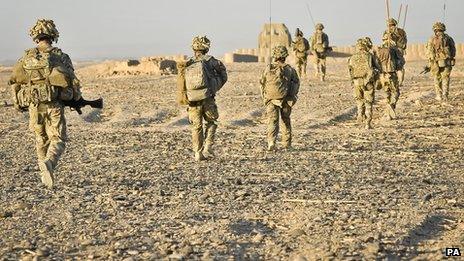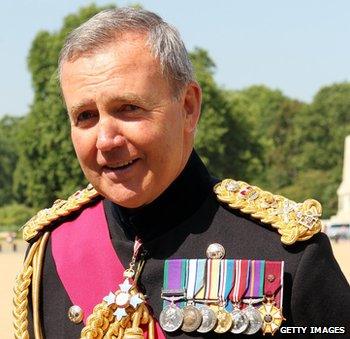Military faces huge challenges, new chief Houghton says
- Published
General Sir Nick Houghton: "I think there are undoubtedly some challenges, some huge challenges"
The new Chief of the Defence Staff, Gen Sir Nick Houghton, says he has taken over at a time of "huge challenges".
The UK's most senior military officer told the BBC the armed forces had shown great resilience in recent years.
But Gen Houghton said it was too soon to judge the recruitment levels to the reserves, which are running at around half the planned levels.
He is responsible for implementing cuts to the Army, while ensuring the Afghanistan withdrawal goes smoothly.
UK troops are continuing to fight a campaign in Afghanistan, while preparing to withdraw - at the same time as reducing the number of regulars by 20,000 and bringing back troops based in Germany.
Gen Houghton, an Oxford University history graduate and former Green Howard, is now the nation's most senior military officer and professional head of the armed forces.
He is responsible for implementing the many simultaneous changes flowing from the Strategic Defence Review, external in 2010.
The review cut 8% from the MoD's already stretched budget.
In his first broadcast interview, Gen Houghton said: "If you just look at what the Army is being asked to do in terms of continuing to fight a campaign, to withdraw and downscale its numbers by 20,000 regulars, to bring 20,000 of its people back from Germany, to restructure, to build up the strength of the reserves, and during all this, take other things like public duties and Olympic security in its stride, yes, these are huge challenges."
So what impact is this having on the armed forces, particularly on morale?

The UK's mission in Afghanistan is drawing to a close
"In terms of morale, it's not about individual happiness," he said.
"It is about the ability to endure in times of real austerity, endure through times of hostility, in times of pressure.
"And I think if anything has demonstrated the resilience of the morale of the British armed forces, it is the last couple of years - and the fact they still continue to perform, and are one of our nation's unique selling points."
'Hard-nosed'
One of the tasks at the top of the agenda is the plan to continue cutting regulars in the Army to 82,000 from 102,000, while trying to increase the number of reservists from 19,000 to 30,000.
Last week, MPs passed a motion that noted concerns about the government's defence reforms "in relation to whether its proposals for the reserve forces will deliver either the anticipated cost savings or defence capability".
So with the current recruitment of reservists lagging well behind target, would he advise the government to think again?
Gen Houghton said: "Well, I think this is more an argument in Parliament than it is one within the armed forces.
"You can't compare these 82,000 regulars of the 21st Century with Victorian figures. These are 82,000 regulars, the vast percentage of which are deployable capability, not mess waiters or guards.
"It's a force that's networked by modern communications. Private soldiers are connected to close air support and artillery fires. The capability of soldiers nowadays are transformed from what they were even a decade ago".
"But of course, size is important, and that is why the reserves provide an essential and cost-effective mechanism of maintaining resilience."
On the level of reservist recruitment so far, Gen Houghton insists it is too early to make a judgement.

Gen Houghton took over as chief of the defence staff in July
"We think that we have produced a good offer. We've got to get out the message that people who join now are joining something that is exciting, will give them all sorts of rewards and has a very, very strong future."
However, after the Parliamentary vote on Syria that rejected UK military action, how does he see their role today?
"Well, I think the message is that we've got to be quite hard-nosed about defining what the core national interest is when we want to use our armed forces, and the utility of doing so."
That does not rule out military action abroad, but it may well be of a rather different sort from Iraq and Afghanistan.
"We want to influence, to use our unique access in all sorts of countries to build capacity, to stabilise, and prevent conflict," Gen Houghton explains, "as well as being the 'go-to' organisation for domestic crisis, whether it's fire strikes, foot and mouth, or Olympic security."
First, though, British combat forces must perform an orderly exit from Afghanistan by the end of next year after 12 years and 445 British lives lost. What is his verdict?
"You've got to really take a strategic look," Gen Houghton said.
"The United Kingdom has been part of an international effort to maintain the integrity of Afghanistan, to give that country the chance of looking after its own security, having a democratic process that elects the next president, that has the prospect of some prosperity and has not been the source of international terrorism. So I would deem that success."
- Published12 October 2013
- Published18 October 2013
- Published17 October 2013
- Published10 October 2013
- Published3 July 2013
- Published22 August 2013
- Published19 March 2013